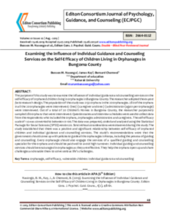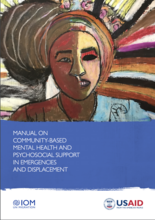Displaying 121 - 130 of 525
This study provides an illustration of a research design complementary to randomized controlled trial to evaluate program effects, namely, participatory peer research (PPR). The PPR described in current study was carried out in a small sample (N = 10) of young adults with mild intellectual disabilities (MID) and severe behavioral problems [in residential care in the Netherlands].
This article describes CONCEPT, a multi‐year initiative to enhance capacity of the US state of Connecticut's child welfare system (CWS) to provide trauma‐informed care.
The purpose of this study was to examine the influence of individual guidance and counselling services on the self-efficacy of orphaned children living in orphanages in Bungoma County, Kenya.
The goal of this study was to examine the contribution of natural mentoring to the improvement of life skills among youth in care in core areas of education, employment, and avoidance of risk behaviours while controlling for personal characteristics and placement history.
Drawing from focus groups with Therapeutic Foster Care (TFC) foster parents, this paper explores different aspects of their experiences, identifies multiple ways in which they need support, and provides recommendations for foster care agencies looking to retain skilled foster parents and increase the quality and stability of children's experience in TFC programs.
This open access study examined the feasibility and acceptability of a randomized controlled trial (RCT) of mentalization-based therapy (MBT), delivered in a family-format, for children who are in foster care in the UK.
The present Manual aims to facilitate mental health and psychosocial support (MHPSS) experts and managers in designing, implementing and evaluating community-based MHPSS (CB MHPSS) programmes, projects and activities for emergency-affected and displaced populations in humanitarian settings.
The purpose of this paper is to propose a conceptual framework on the key determinant of psychosocial adjustments in terms of behavior, social, emotion and mental health among abused children in residential care.
The aim of the current study is to identify different subgroups of adolescents placed in Residential Care (RC) on the basis of different dynamic factors and analyze their relation with antisocial behavior and family violence.
In France more than 140 000 children live in foster homes under the responsibility of the French Child Protection Agency. These children have lived in environments that cannot be good for their development and have been separated from their families which have to have consequences on their mental development. A literature review in France and abroad was made to identify the profiles of these children, their risk factors, and the mental disorders they can present.



